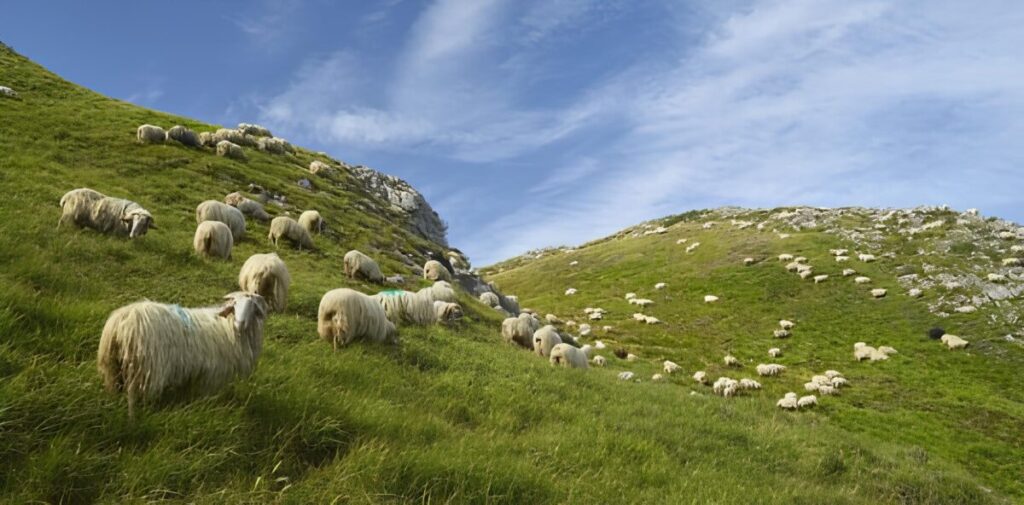“We have moved from a system in which the sun provided most of the energy and nutrients to a system of non-renewable resources.” Nicolas Bricas, socio-economist of food at CIRAD (Centre de coopération internationale en recherche agronomique pour le développement) and holder of the UNESCO Chair on World Food, examines the food system of tomorrow: what are the current agricultural and food challenges? How can we respond to them? What type of agriculture should we aim for to feed the French population?
“At the beginning of the 20th century, coal, potassium, nitrogen, oil, uranium – non-renewable resources – were discovered and used massively. We then shifted to this new system that allowed food production to increase faster than the population.” What Nicolas Bricas describes is the situation of food overproduction that began to establish itself globally from the 1980s.
In the 20th century in France, a first social contract around food
He emphasizes right away that the global population is “not at all facing a risk of food shortage.” But directly after World War II, efforts were already underway to find the right adjustments between French agriculture and food. In this sense, a social contract was established, a solution for “the cheapest possible food, without short-term poisoning.” Productivity of land and labor was increased through chemical fertilizers and technological advancements.
A series of institutions also emerged to implement this contract: private suppliers, insurance and public banks, research and inter-professionals (with agricultural unions). “A whole food system! But, from the 1970s, we realized that this model would eventually hit a wall. We are depleting non-renewable resources, saturating natural environments, and polluting. Moreover, we are unable to properly compensate producers, value added accumulates downstream, and we face new public health issues (overweight, degenerative and cardiovascular diseases…) attributable to the quality of products. They poison us in the medium and long term,” continues the socio-economist.
Imagining a food democracy
Environmental, health, social, and governance issues are added to Nicolas Bricas's demonstration. They justify the need to change the agri-food model (that is, agricultural production, its transformation, marketing, consumption, and waste management). For this, it would involve, according to the specialist, transforming and replacing all concerned actors “to bring about another social contract. A complicated project because some actors have built their wealth on the old model and intend to continue this way.”
Rather than a “new optimistic rush forward, with the third agricultural revolution” (the new digital and genetic technologies, editor's note), Nicolas Bricas leans towards a food democracy. Buffeted between the collapse of biodiversity and the arrival of these new technological developments, the agri-food system is at a crossroads. Our relationship with food is changing, as it is a means of connecting with others and the biosphere. This is reflected in the fights against animal abuse, in particular. Also in the way we practice agriculture. “Our way of building our food is our way of building ourselves in the world. And today, it is up to citizens to decide, to take back the floor; not to companies or experts of the past.”
A Common Food Fund
In the city of Montpellier (507,000 inhabitants), a citizen food council has emerged. A space where citizens can reflect, train, meet various experts in the field, and develop proposals for the food system of future generations.
Let’s take the example of their first citizen assembly on food, in July 2021. About sixty residents gathered and “wonder how to give everyone access to quality food. They themselves define this quality,” presents the expert. This leads to the project of constructing the Common Food Fund: 380 randomly selected residents contribute every month between 1 and 150 euros, depending on their social class “and what they want to give.” In return, they receive 100 euros each month to spend in pre-selected sales locations in the city – local farmers' markets and independent stores. “This gives everyone access to quality food and prompts them to reflect on the issue.”
This experiment is inspired by the Social Security for Food project currently under consideration in France. The idea is to add a “food” branch to the health social security, based on the initial model established by workers. “The goal, in the long term, would be for all French citizens to contribute to a fund based on their standard of living and receive 150 euros per month dedicated to this food,” continues Nicolas Bricas.
The necessity of involving citizens
Many local initiatives exist and experiment with these new ways of producing. “Like with organic farming a few decades ago,” comments the socio-economist. “Today, we talk about agroecology, with equity for farmers in the supply chains, a more balanced governance, and new ways of transforming productions. These alternative models deserve to be debated to address the challenges of non-destruction of agriculture and food.”
So, have we found the solution for our food of tomorrow? Nicolas Bricas tempers: “These are inspiring models and benchmarks, but it’s not necessarily exactly where we need to go. It’s precisely because we don’t have the exact answer that citizens need to be invested. The management of our food system is monopolized by a handful of actors, with a counter-power that is not strong enough. We need to change this balance of power by creating these citizen food committees.”

Cover photo: Healthy food, based on common sense ©Pixabay
